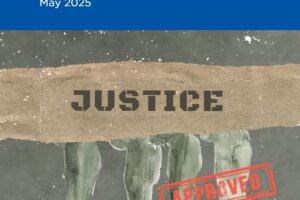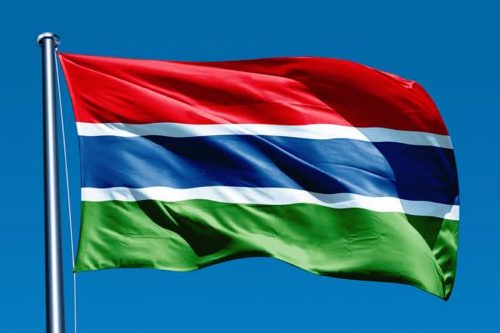

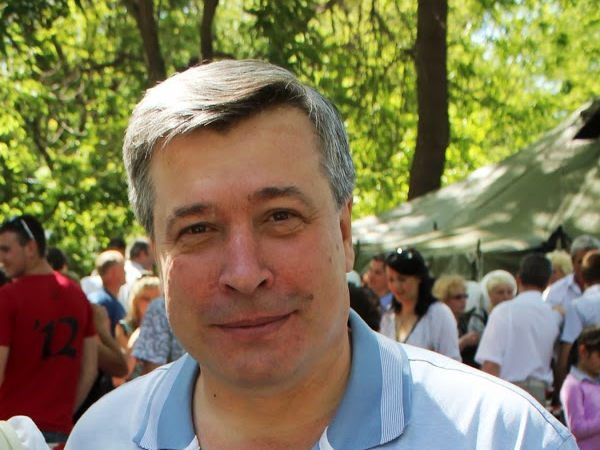
Ukraine: killing of lawyer must be investigated promptly
The ICJ calls on the Ukrainian authorities to investigate the murder of lawyer Olexandr Ivanov, killed today with an automatic weapon near SIZO (Pre-trial Dentention Centre) №6 in Kropyvnytskyi.
The shooting was carried out from a car by unknown persons. The lawyer died on the spot. Another person injured in the incident was hospitalized in critical condition.
“The killing of lawyer Oleksandr Ivanov must be independently, promptly, and thoroughly investigated and the perpetrators brought to justice,” said Temur Shakirov, ICJ Senior Legal Adviser.
“Such crimes strip any legal reforms of their positive impact if lawyers’ life is always in danger when exercising their functions,” he added.
The police have confirmed the occurrence of the killing and initiated an investigation preliminarily qualified as intentional murder under article 115-2 of the Criminal Code of Ukraine.
The Ukrainian National Bar Association (UNBA) is planning to convene an emergency meeting of the Committee on Protection of Lawyers Rights and Professional Guarantees. The UNBA has also referred to the leadership of regional prosecution and police authorities to bring the case under personal control.
“During its recent mission to Ukraine the ICJ heard of cases of killings of lawyers and this case demonstrates that little progress has been achieved in addressing the security of lawyers in Ukraine,” said Shakirov.
Additional information:
International human rights law, including the European Convention on Human Rights to which Ukraine is a party, requires that states take steps to protect the life and physical integrity of persons who they know or ought to know are at real risk of violence.
According to the UN Basic Principles on the Role of Lawyers, governments must ensure that lawyers are able to perform all of their professional functions without intimidation, hindrance, harassment or improper interference (principle 16). The UN Basic Principles specify that “[w]here the security of lawyers is threatened as a result of discharging their functions, they shall be adequately safeguarded by the authorities” (principle 17).
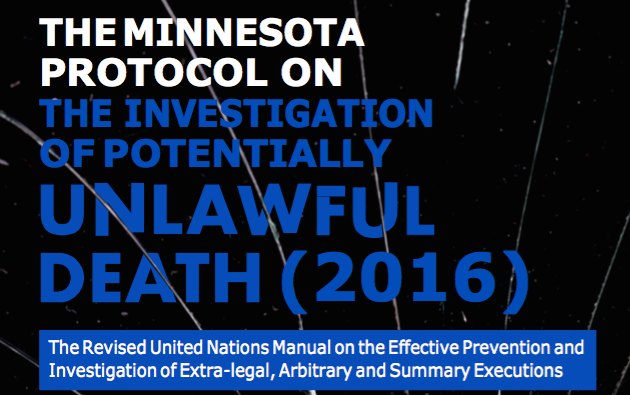
ICJ promotes international standards on the conduct of investigations with Myanmar police and prosecutors
On 28 February and 1 March, the ICJ met with senior officials of the Myanmar Police Force (MPF) and the Union Attorney General’s Office (UAGO) in Nay Pyi Taw.
The purpose of these talks was to promote the conduct of effective investigations into potentially unlawful deaths and enforced disappearance in accordance with international human rights law and standards, particularly the Minnesota Protocol on the Investigation of Potentially Unlawful Deaths (“Minnesota Protocol”).
Under customary international law, the right to life, and the right to be free from torture and other ill treatment, is not to be restricted even during an armed conflict or declared public emergency. All States are obliged to investigate, prosecute and punish acts that constitute violations of the right to life, and to provide effective remedies and reparations to victims.
Published by the United Nations Office of the High Commissioner for Human Rights, the Minnesota Protocol provides guidance to authorities on investigating acts amounting to human rights violations, including when State actors may have been involved. Drawing upon international law and standards, including in relation to the rights of victims and their families, the Protocol includes detailed guidelines on crime scene investigation, interviews, exhumations and autopsies.
Since December 2017, the ICJ has co-hosted four regional workshops in Thailand focused on this topic. Attendees have included lawyers, academics and State authorities from Thailand, Cambodia, Nepal, India and Myanmar.
Frederick Rawski, Director for Asia and the Pacific, Sean Bain, Legal Adviser, and Ja Seng Ing, Legal Researcher, composed the ICJ delegation in Myanmar’s capital.
Frederick Rawski proposed opportunities to continue these discussions on international standards into investigative procedures and processes. The ICJ Team also provided updates about related activities undertaken regionally and in Myanmar.
The ICJ has worked with the UAGO since 2014 to provide assistance on prosecutorial independence and human rights in the context of Myanmar’s broader democratic and legal reforms. This was the third meeting with the MPF over the last twelve months to discuss the conduct of investigations inline with international human rights law and standards.
Members of UAGO and MPF received copies of the Minnesota Protocol and indicated these would be shared with officials involved in the conduct of investigations or in setting the standards for them under national law in Myanmar.
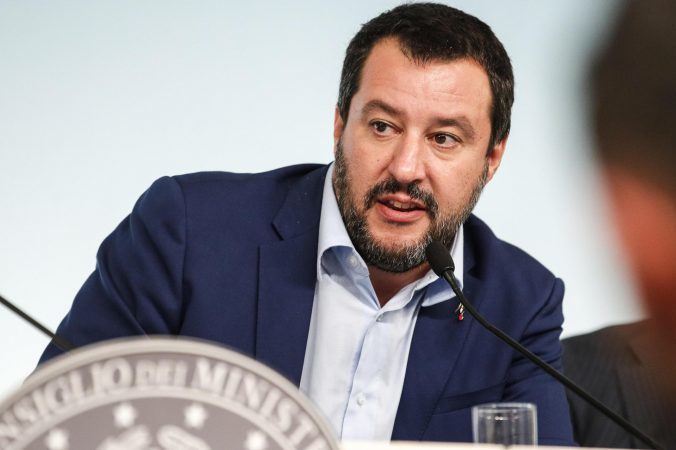
Italy: blocking investigation of Matteo Salvini would undermine the rule of law, urges ICJ
The ICJ today called for the Italian Senate to allow for the investigation of the Minister of Interior and Vice-President of the Council of Ministers, Matteo Salvini, for his role in the alleged arbitrary deprivation of liberty of some 177 persons, including potential refugees, held for five days on the “U-Diciotti” boat last summer.
The ICJ said that the Italian Senate’s Commission on Elections and Immunities should recommend the authorization of the criminal investigation to the full Senate, where Matteo Salvini also sits as a Senator.
“The decision on investigation of gross human rights violations such as mass and arbitrary deprivation of liberty should not be subject to political scrutiny but be left to the assessment of the judiciary,” said Massimo Frigo, Senior Legal Adviser for the ICJ Europe Programme.
The indictment for “kidnapping” against Minister Salvini has already been approved at the judicial stage by the Tribunal of Ministers of Catania, which affirmed that Minister Salvini is alleged to have abused his administrative power in this matter for the political goal of negotiating resettlements with other European countries.
“No human being should effectively be made hostage for the purpose of political negotiations,” said Massimo Frigo.
“It does not matter which country may have been primarily responsible for the rescue at sea. No authority may arbitrarily restrict of the right to liberty of 177 human beings,” he added.
The ICJ considers that it is highly problematic for the principle of the rule of law that the decision on prosecution for a crime underlying a gross violation of human rights, such as kidnapping, be entrusted to a political body.
This decision should be left to the judiciary based on legal and not political grounds.
Under international human rights law, including the European Convention on Human Rights and the International Covenant on Civil and Political Rights, States have an obligation to investigate, prosecute, try and, if found guilty, convict persons responsible of gross violations of human rights, among which counts the arbitrary deprivation of liberty.
This applies to all State officials, irrespective of their position of authority.
Contact
Massimo Frigo, ICJ Senior Legal Adviser, t: +41 22 979 38 05 ; e: massimo.frigo(a)icj.org
Background
The Italian “U. Diciotti” boat was at the centre of a political scandal last August when the Minister of Interior Matteo Salvini refused disembarkation of 177 people for several days in order to negotiate their resettlement with other European countries.
While the boat entered Italian waters on 20 August, they were eventually disembarked in the night between Saturday 25 and Sunday 26 August after some countries and the catholic church made some nominal declaration of resettlement or reception.
Minister Salvini was later accused of “kidnapping” for having arbitrarily deprived of their liberty the 177 persons on board the “U.Diciotti”. While the prosecutor in the case asked for the dismissal of the charges, the Tribunal of Ministers, composed of ordinary judges, that is responsible for the legal assessment of the indictment, held the indictment to be in accordance with the law and that sufficient suspicion existed to warrant an investigation.
According to article 96 of the Constitution and articles 8-9 of the Constitutional Law no. 1 of 16 January 1989, it is up to the Parliament to authorize the investigation and prosecution of a Minister. The decision would therefore be up to the Senate in the case of Minister Salvini, as he is a Senator. The Senate may refuse by absolute majority, if it considers “that the person has acted for the protection of a State interest that is constitutionally relevant or for the pursuance of a preminent public interest in the function of Government” (unofficial translation). No appeal is possible against this decision.
Reportedly, the President of the Council of Ministers, Giuseppe Conte, the Vice-President of the Council of Ministers, Luigi Di Maio, and the Minister Danilo Toninelli, have submitted observations to the Senate’s Committee holding that the decision in the case was the reflecting the line of the whole Government and not only of the Minister of Interior.
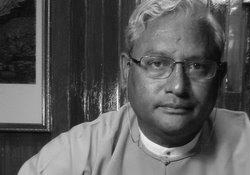
Myanmar: ICJ marks 2nd year anniversary of the killing of lawyer U Ko Ni
On the second anniversary of the killing of prominent lawyer U Ko Ni, in public view at Yangon International Airport, the ICJ repeats its calls for a thorough and impartial investigation with a view to establish the facts, to deliver justice and to deter the repetition of similar crimes.
“This brazen killing of a prominent democracy advocate demands a rigorous State response to show this type of crime will be fully punished,” said Frederick Rawski, the ICJ’s Director for Asia and the Pacific.
Despite an official investigation and reports of more than 100 court hearings, nobody has been held accountable for U Ko Ni’s death – criminally or otherwise – and the circumstances have not yet been satisfactorily explained.
“Myanmar simply cannot satisfy its international law obligations without conducting an impartial and independent investigation that is free of military influence. Such an investigation is a pre-requisite for conducting an effective prosecution in a fair trial setting,” added Rawski.
U Ko Ni was well known as a vocal advocate for human rights and democratic reform in Myanmar. As an adviser to the National Legal of Democracy party, he was involved in creating the position of State Counselor, which formalized a leadership role for Daw Aung San Suu Kyi, despite a constitutional provision barring her from the Presidency.
At the time of his death, it is understood that U Ko Ni was working on proposals to replace Myanmar’s 2008 Constitution, the source of law underpinning military power.
“A credible justice process is required not only for U Ko Ni and his family, but to demonstrate the State will protect the right to life of all people including democracy advocates,” said Sean Bain, legal adviser for the ICJ.
“A crime of this nature stifles participation in the democratic process and so an effective justice process is imperative to deter its repetition,” Bain added.
Myanmar has a particular obligation to ensure that lawyers and others acting as human rights defenders are protected in carrying out their work.
Any justice process must be timely, effective and shed light on the facts.
The investigation into U Ko Ni’s killing has been beset by obstacles, including the unknown whereabouts of a primary suspect, the incorrect identification of a deceased individual as a suspect and the arrest of a person with the same name, and reported military involvement in the police investigation. Lines of inquiry related to the political motivations for the killing, particularly considering the military links of many suspects, do not appear to have been pursued satisfactorily, nor impartially, given military involvement in the investigation.
Criminal proceedings in Yangon’s Northern District Court, and related proceedings in the Yangon High Court, have been sluggish. Observing lawyers and individuals including from the ICJ have noted multiple instances of admission into evidence of testimony that appears to be irrelevant, failures of key witnesses to appear, and the long drawn out process of court proceedings whereby weeklong delays are common while continuances over successive days are rare.
These issues are emblematic of challenges in Myanmar’s justice system previously identified by the ICJ in which police, prosecutors and courts generally lack the independence and or will to effectively administer justice, particularly in politically sensitive cases.
“Two years is an incredibly long time to get to the position we are in now, and in our experience this highlights broader problems with the administration of justice in Myanmar,” added Bain.
Contact
Frederick Rawski, ICJ Asia Pacific Region Director, e: frederick.rawski(a)icj.org
Sean Bain, ICJ Legal Adviser, e: sean.bain(a)icj.org
Download:
Myanmar-Ko Ni Statement-News-web stories-2019-ENG (full story with background information, PDF)
Myanmar-Ko Ni Statement-News-web stories-2019-BUR (full text in Burmese, PDF)
Read also:
Myanmar: reverse laws and practices that perpetuate military impunity – new ICJ report
Killing of lawyer U Ko Ni must be promptly and impartially investigated


